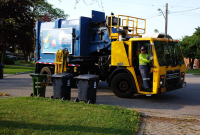Support strong Canadian climate journalism for 2025
The climate emergency is unprecedented among the environmental emergencies the world has faced. But what’s not unprecedented is our reaction to the emergency. According to Seth Klein, we are not mobilizing the way we should to fight it.
In his book, A Good War: Mobilizing Canada for the Climate Emergency, the author and policy consultant laid out lessons from the Second World War and how we could apply them to the climate crisis fight.
Klein argues the climate crisis needs the same spirit of collaboration that was summoned during the Second World War.
When his book was released in 2020, Maxed Out host Max Fawcett wasn’t swayed by Klein’s argument. He even wrote a column slagging it. But that didn’t stop Klein from agreeing to spar with Max and put his book to the test.
Klein said he wrote the book as a reminder “of what it means to treat emergencies like real emergencies.”
When Max brought up the value of incrementalism — moving slowly to bring people along, especially in fossil fuel-focused economies like Alberta — Klein doubled down on the war metaphor.
“You have to move from voluntary to mandatory measures, speak the truth and commit to leave no one behind. I'm convinced that's when we'll start to see the curve bend the way the science tells us it has to bend,” Klein said.

It’s summer and Maxed Out’s first season is finished. Max will be back in the fall. But Max’s conversation with Klein is worth a relisten — or a listen if you missed it the first time. Listen to “Mobilizing for War” on Maxed Out.
Maxed Out is made possible by listeners like you. If you’ve supported the podcast already, thank you. If you haven’t, click here to donate what you can to help us keep producing valuable journalism.
Got questions or comments? Email us at [email protected]. You can also follow us on Twitter @NatObserver.






Comments
No. The evidence illustrates a war footing never materializes despite books and pundits calling for one. There are too many vested interests that have governments by their necks, hence watered down policy at best and outright denial at worst.
Pause for a sec and look for things that have worked. Number One on the list is economics. Profitable private investments in renewables that have lowered prices to outcompete fossil fuels has had phenomenal success. Catalysts like Joe Biden's IRA policy and deep R&D into batteries are having profound positive effects and are also very disruptive to the carbon industry and the demand for oil and gas.
None of these save the response in Europe to an actual war had anything to do with the semantics of a war footing.